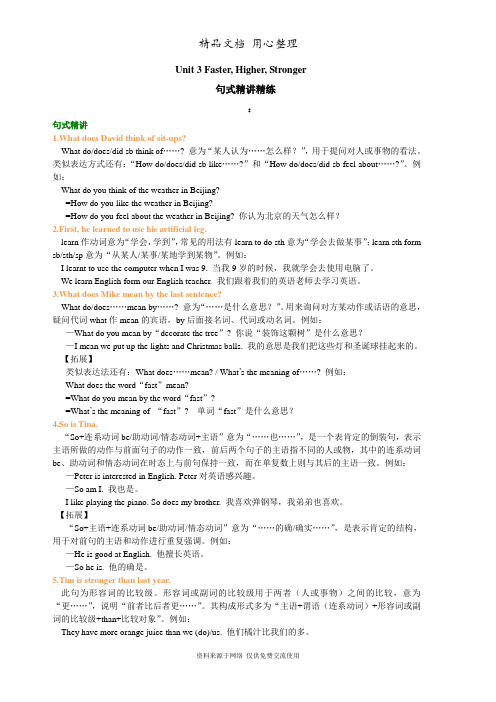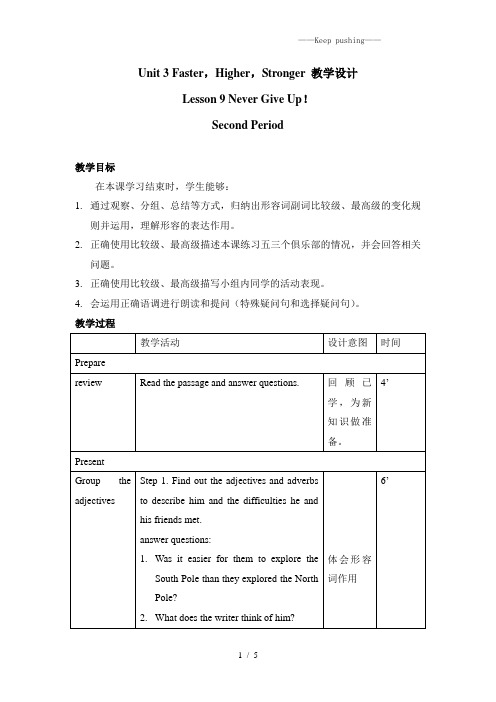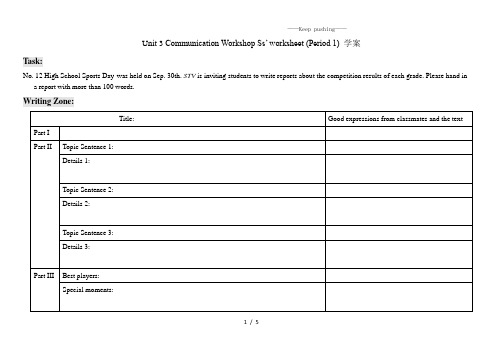新北师大版八年级英语上册Unit 3 Faster,Higher,Stronger—7 Time to Exercise 第1课时教学设计
最新北师大版八年级英语上册课件:Unit 3 Faster,Higher,Stronger Lesson 8 Olympic Winners 第1课时

lifting
weightlifter 105kg
Whose photo? Why ?
最新初中英语精品课件设计
What do you think of them ? How did they become Olympic winners?
great, wonderful ,talented, brave, hard-working, keep trying hard, never give up …
Maurren
the strongest and heaviest
Matthias
最新初中英语精品课件设计
The oldest and the youngest
Name Sports
Is horse-riding easy for a 67-year-old man?
athletes Age
Compete v.竞争,对抗 What did he do in 1964?
最新初中英语精品课件设计
最新初中英语精品课件设计
The tallest Yao Ming
basketball
basketball player
2.29m
Deng Linlin gymnastics
The shortest What do you think of them?
gymnast
about 1.36m
Wang Xin diving
最新初中英语精品课件设计 diver
long-jumper
7.04 meters
What do you think of them?
最新初中英语精品课件设计
The heaviest and strongest
北师大版初中英语八年级上册句法讲解Unit 3 Faster,Higher,stronger(句式)

Unit 3 Faster, Higher, Stronger句式精讲精练:句式精讲1.What does David think of sit-ups?What do/does/did sb think of……? 意为“某人认为……怎么样?”,用于提问对人或事物的看法。
类似表达方式还有:“How do/does/did sb like……?”和“How do/does/did sb feel about……?”。
例如:What do you think of the weather in Beijing?=How do you like the weather in Beijing?=How do you feel about the weather in Beijing? 你认为北京的天气怎么样?2.First, he learned to use his artificial leg.learn作动词意为“学会,学到”,常见的用法有learn to do sth意为“学会去做某事”;learn sth form sb/sth/sp意为“从某人/某事/某地学到某物”。
例如:I learnt to use the computer when I was 9. 当我9岁的时候,我就学会去使用电脑了。
We learn English form our English teacher. 我们跟着我们的英语老师去学习英语。
3.What does Mike mean by the last sentence?What do/does……mean by……? 意为“……是什么意思?”。
用来询问对方某动作或话语的意思,疑问代词what作mean的宾语,by后面接名词、代词或动名词。
例如:—What do you mean by“decorate the tree”? 你说“装饰这颗树”是什么意思?—I mean we put up the lights and Christmas balls. 我的意思是我们把这些灯和圣诞球挂起来的。
北师大版八年级英语上册Unit 3 Faster,Higher,Stronger—9 Never G

Unit 3 Faster,Higher,Stronger 教学设计Lesson 9 Never Give Up!Second Period教学目标在本课学习结束时,学生能够:1.通过观察、分组、总结等方式,归纳出形容词副词比较级、最高级的变化规则并运用,理解形容的表达作用。
2.正确使用比较级、最高级描述本课练习五三个俱乐部的情况,并会回答相关问题。
3.正确使用比较级、最高级描写小组内同学的活动表现。
4.会运用正确语调进行朗读和提问(特殊疑问句和选择疑问句)。
教学过程Lesson 9 Never Give Up!(2)1.Group the adjectives.the worst long sadhis most important famous the best careful2.Fill in the blanks.3.Sum updangerous bad difficult better worse more difficult the youngest brave4.Challenge yourself. Try something new.5.今天进行小组活动(板报小组,英语剧组,物理实验小组,篮球队,升旗组,接力赛等)总结,在小组活动中,一定有我们可以学习的榜样吧,或许他/她是画的最好的,说话最有礼貌的,又或是比较细心,请你用今天学习到的语言知识,说说我们可以向他们学习什么吧。
Tips:适当的比较,会让你更加有说服力;结合实例,更容易使大家信服哦。
__________________________________________________________ __________________________________________________________ __________________________________________________________ __________________________________________________________ __________________________________________________________教师的职务是‘千教万教,教人求真’;学生的职务是‘千学万学,学做真人’。
北师大版八年级英语上册Unit 3 Faster,Higher,Stronger Communica

______________________________________________________________________________
Evaluation Chart
自我评价Name: ____________________
符合题意,要点齐全
(如有该项,请在下面打勾)
总体介绍
各班体育成绩对比
杰出运动员
难忘瞬间
文章层次清晰,有主题句和细节信息
(如有该项,请在文章标出,并在表格内打勾)
主题句1+细节1
主题句2+细节2
主题句3+细节3
______________________________________________________________________________
______________________________________________________________________________
______________________________________________________________________________ _________________________
_________________________
______________________________________________________________________________ _________________________
北师大版八年级英语上册 Unit 3 笔记

爸爸两年前戒烟了。
三、知识梳理
5. at the age of 在...岁时 He could paly the violin at the age of five. 他五岁时就能拉小提琴。 6. have an accident 发生事故 He had an accident on his way home. 他回家的途中发生了事故。 7. half 用作形容词,意为“一半的,半数的”。half 可以与 a/an 连用,也可以构成“half + the + 名词”或“half + one's + 名词”的搭配。 half an hour 半小时 Half the students are girls 半数的学生为女孩子。 He lost half his left leg and half his right arm.
三、知识梳理
1. It's time for sth. 到...时间了 It's time for after-class activities.
到课下活动的时候了。
2. any other+单数名词 I was faster than any other student.
3. a bit 程度副词,副词可以修饰动词、形容词、副词。
一、重点短语 二笔记
一、重点短语
1、do the high jump 跳高 2、do the long jump 跳远 3、do push-ups 做俯卧撑 4、do sit-ups 做仰卧起坐 5、do pull-ups 做引起向上 6、climb a rope 爬绳 7、after-class activities 课下活动 8、break the record 打破记录 9、a bit 稍微;有点儿 10、joke around 开玩笑
(新)北师版八上Unit 3 Faster,Higher,Stronger Comm 教案

Unit 3 Communication Workshop教材分析本课是北师大版《初中英语》八年级上册教材第3单元的Communication Workshop局部,话题涉及课标第16项文娱与体育,第56个子话题,即体育与赛事。
本课是一节写作输出课,学生通过学习一篇运动会年级比赛成绩的报道,结合在此方面的,完成写作任务。
在写作过程中,学生还可以通过预先完成的运动会本年级比赛情况信息卡,进一步丰富自己写作的细节描述。
在本单元第1-3课,学生已经通过听力和阅读活动,进行了语言学习和初步应用,即运用形容词和副词的比较级和最高级对体育工程的难易情况、运发动的个人信息及比赛成绩、极地探险等进行简单描述。
本课是单元学习内容的综合运用与输出,侧重语言的体验与应用,结合话题,培养写作和口语表达能力。
在本课,学生要以书面的形式写一篇运动会本年级的比赛成绩的报道。
此话题贴近学生生活,是学生熟悉的话题。
但是如何撰写报道,如何获取比赛结果真实信息,以及如何运用所学形容词和副词比较级和最高级来丰富地描述各班的比赛结果及具体表现可能是学生有困难的地方。
因此本课的教学设计分为两个课时。
第一课时在头脑风暴激活话题下的旧知后,布置写作任务。
在写作内容方面,学生结合在本单元话题下学习后的已有知识,如话题、词汇、句型等,充分表达自己的看法,并落实到笔头。
在写作遇到困难时,通过勾画、小组讨论、全班分享等活动,小组合作学习范文的写作内容及方法〔即运动会根本介绍、各班比赛结果及具体表现、杰出运发动和难忘瞬间〕,用于进一步改写自己的文章。
在写作中语言的使用方面,学生初步写作后,发现在比照各班比赛结果及具体表现方面句式结构比较单一,此时再次通过找到范文中比照各班比赛结果及具体表现方面的句式,并头脑风暴回忆前三课当中所学的句式,从而运用形容词和副词比较级和最高级及其他句式来提供细节支撑并丰富语言自己文章的语言。
最后初步完成一篇运动会本年级的比赛成绩的报道。
北师大八年级上册英语Unit 3 Faster,Higher,Stronger—7 Time to Exercise 第1课时精品教案

英语听说课教学设计课题:北师大版《初中英语》八年级上册教材Unit 3 Faster, Higher, StrongerLesson 7 Time to exercise(第一课时)教材分析本课是北师大版《初中英语》八年级上册教材Unit 3 Faster, Higher, Stronger,Lesson 7 Time to exercise,话题为(13) 卫生和健康。
本课是本单元的第一课,主要学习的内容是通过听对话,获取David和Mike本周要做的运动项目、原因等方面的信息,为第8课介绍奥运冠军、第9课南极探险等话题做好铺垫。
在七年级中,学生学习过有关运动的词汇,本课将进一步谈论有关运动的话题。
在语法方面,学生并未系统接触比较级的用法,这将是本课的难点。
本课的教学设计分两个课时。
第一课时侧重对听力材料细节信息的提取。
学生在学习了有关运动词汇的基础上,通过听力材料进行语言输入,获取David和Mike本周要做的运动项目、原因等方面的信息,了解人物的特征和性格,初步感知比较级的用法并谈论自己喜欢的运动。
第二课时在复习巩固课文内容和语言的基础上,梳理和学习本课的重点语法内容——比较级。
学生通过观察,总结比较级的形式和用法。
在语境中进行多次练习,最后运用比较级比较两个运动中心的质量。
教学内容1. 话题:卫生与健康——体育健身2. 词汇:⑴按《义务教育英语课程标准(2011年版)》的要求分类:五级词汇:push-up, sit-up, race, rope, after-class, record, bit, sick, active, joke, weak, size课标外词汇:average⑵按照话题分类:Physical fitness and exercise: push-up, sit-up, race, record, ropeFeelings and emotions: sick, weak3. 策略:围绕话题进行词汇分类;听中记录关键词获取主要信息4. 功能:比较级第一课时First Period教学目标:在本节课结束时,学生能够1. 认读并说出有关运动的词汇。
最新北师大版八年级英语上册Unit3 Faster Higher and Stronger同步练习含答案

Unit3 Faster, Higher and Stronger一、单项选择1. You needn't wear a jacket today. It's than yesterday.A. warmB. warmerC. coldD. colder2. --- Why don't you like winter in Beijing?--- Because it is winter in Guangzhou.A. as cold asB. much colder thanC. not so cold asD. not colder than3. The population of Tianjin is than that of Shanghai.A. largeB. lessC. smallerD. fewer4. Thanks to the new inventions, our lives are much than before.A. convenientB. more convenientC. most convenientD. the most convenient5. Now the air in our city is than it used to be. Something must be done to stop it.A. goodB. badC. worseD. better6. --- Hi, Ella, which is the street in your city?--- High Street. Many people go shopping there.A. busierB. quieterC. busiestD. quietest7. The Changjiang River is the third in the world.A. long riverB. long riversC. longest riverD. longest rivers8. Of all the teams in NBA. I think the Los Angeles Lakers played this year.A. most successfullyB. the more successfullyC. very successfullyD. much more successfully9. I am good at math, but his English is than mine.A. much betterB. more betterC. very betterD. pretty better10. My time in the middle school was one of periods of my life.A. excitingB. more excitingC. the more excitingD. the most exciting11. Lin Fang comes home than before this term. She doesn't have so many classes in theafternoon.A. earlyB. earlierC. lateD. later12. The sun is the earth.A. big thanB. small thanC. bigger thanD. smaller than13. A car is than a truck.A. much lightB. much lighterC. more lightD. more lightest14. --- Time is money.--- But I think it is money.A. the same asB. as important asC. more important thanD. so important than15. --- Mike thinks of others than of himself.--- That's why everyone likes to make friends with him.A. littleB. muchC. lessD. more二、单词拼写(单句首字母填空)16. She won the first place in the singing c .17. --- Where's your mother, Tom?--- She is p for supper in the kitchen.18. He was awarded because he took an a part in class activities.19. The song is very p . Everyone likes singing it.20. Tony is a b boy. He saved three children from the fire.21. --- When did you a at the Beijing Station?--- At about seven in the morning.22. The girl is still very w after her illness.23. Liu Xiang broke the world r with a time of 12.88 seconds in 2006.24. He told us a funny j last night.25. Be c when you drive; it's very dangerous to drive in such bad weather.三、单词拼写(根据中文提示拼写单词)26. Brenda spent all day (准备) the meal.27. I have already won the first prize in the city surfing (比赛).28. Sun Yang broke the world (记录) in swimming.29. My sister is good at maths, but a litter w (弱) in English.30. Jack takes an (积极的) part in volunteers during summer vocations.31. This young nurse can look after these (患病的) people very well.32. He is on the (国家的) football team.33. You must be (小心的) when you go out at night.34. Believing in yourself is the first step on the road to (成功).35. Football is very (受欢迎的) with young people.四、翻译(根据中文提示完成句子)36. 这只猎豹比那只跑得快得多。
- 1、下载文档前请自行甄别文档内容的完整性,平台不提供额外的编辑、内容补充、找答案等附加服务。
- 2、"仅部分预览"的文档,不可在线预览部分如存在完整性等问题,可反馈申请退款(可完整预览的文档不适用该条件!)。
- 3、如文档侵犯您的权益,请联系客服反馈,我们会尽快为您处理(人工客服工作时间:9:00-18:30)。
Unit 3 Faster, Higher, Stronger 教学设计Lesson 7 Time to exercise(第一课时)教材分析本课是北师大版《初中英语》八年级上册教材Unit 3 Faster, Higher, Stronger,Lesson 7 Time to exercise,话题为(13) 卫生和健康。
本课是本单元的第一课,主要学习的内容是通过听对话,获取David和Mike本周要做的运动项目、原因等方面的信息,为第8课介绍奥运冠军、第9课南极探险等话题做好铺垫。
在七年级中,学生学习过有关运动的词汇,本课将进一步谈论有关运动的话题。
在语法方面,学生并未系统接触比较级的用法,这将是本课的难点。
本课的教学设计分两个课时。
第一课时侧重对听力材料细节信息的提取。
学生在学习了有关运动词汇的基础上,通过听力材料进行语言输入,获取David和Mike本周要做的运动项目、原因等方面的信息,了解人物的特征和性格,初步感知比较级的用法并谈论自己喜欢的运动。
第二课时在复习巩固课文内容和语言的基础上,梳理和学习本课的重点语法内容——比较级。
学生通过观察,总结比较级的形式和用法。
在语境中进行多次练习,最后运用比较级比较两个运动中心的质量。
教学内容1. 话题:卫生与健康——体育健身2. 词汇:⑴按《义务教育英语课程标准(2011年版)》的要求分类:五级词汇:push-up, sit-up, race, rope, after-class, record, bit, sick, active, joke, weak, size课标外词汇:average⑵按照话题分类:Physical fitness and exercise: push-up, sit-up, race, record, ropeFeelings and emotions: sick, weak3. 策略:围绕话题进行词汇分类;听中记录关键词获取主要信息4. 功能:比较级第一课时First Period教学目标:在本节课结束时,学生能够1. 认读并说出有关运动的词汇。
2. 通过听对话,获取David和Mike本周要做的运动项目、原因等方面的信息,了解人物特征和性格。
3. 通过观察句子,初步感知比较级的形式和用法,并初步运用比较级谈论自己喜欢的运动。
4. 树立运动的意识。
教学重点:通过听对话,获取David和Mike本周要做的运动项目、原因等方面的信息,了解人物特征和性格。
教学难点:通过观察句子,初步感知比较级的形式和用法,并初步运用比较级谈论自己喜欢的运动。
教学资源:教材、录音、PPT、等。
教学活动设计意图Lead inStep 1 Lead in Lead to the topic of this lessonSs make a guess and answer the questions.T: Today we ‘re going to learn Unit 3, Lesson 7. Can you guess whatare we going to talk about?通过问答,引入本课话题,激起学生兴趣CWIW1’Pre-listeningStep 2 Words study Learn and practice the new words.1.Ss recall the words by brainstorming the sports they often do.T: What sports do you often do?2.Students learn the new phrases with the help of pictures(1)Look at the pictures and tell the words(2)Read the words after T.3. Ss talk about the sports.Q:Which sport is easy (hard) for you? Why?(1)T makes an example.(2)Ss discuss in pairs.(3)Ss share in class.通过头脑风暴激活学生已知的话题词汇。
学习本课未知话题词汇,为听力扫清障碍教师引导学生谈论已学的运动,进一步练习新词汇,熟悉话题,为听力做准备。
CWIWPW5’While-listeningStep 3 Listening 1st listeningSs get general information by answering the questions.Q1: Who are they?Q2: What do you think of them?T:Two of my friends are also talking about sports. Let’s listen to thedialogue and try to find out the answers.(1)Ss listen, write down the names and circle the words that matcheach person.(2)Ss share answers and tell the reasons.T: Maybe we have different answers and opinions. Tha t’s OK. Don’tworry. After we finish listening, we will go back to the questionagain. Don’t forget it.2nd listeningPart I1. Ss listen to the first part of the dialogue and fill in the table.(1) What sports are they talking about?(2) Does David choose the sport or not?Does Mike choose the sport or not?(3) Choose the reasons or ideas for each person.2. Ss listen for the second time and choose T or F for details(1) get the meaning of new phrases(2) help Ss get the mind map of the reasons for deep understanding.3rd listeningPart II通过第一遍听,学生获取有关对话人物信息并初步感知人物特征。
学生可根据自己听到的信息自由谈论自己对人物的感知。
学生答案可能并不精确,但没关系,在听完细节信息后,教师会再度引导学生了解人物特征。
这一活动也可以激发学生求知欲,增强听力动机。
通过第二遍听,获取人物选择运动项目的原因或对于项目的态度。
通过教师设计的细节问题,引导学生进一步了解对话中的细节信息,并帮助学生理清因果关系,形成思维导图。
通过第三遍听,获取人物IWCWPW20’1. Ss listen to the second part of the dialogue and fill in the table.(1) What sports are they talking about?(2) Does Mike choose the sport or not?(3) Fill in the blanks to get the ideas of Mike and David.2. Ss listen for the second time and choose the pictures for reasons.(1) Why is climbing a rope easy for David?T: What do you think of David?(2). Why does David think Mike is good at jumping?(3). Why can Mike jump higher than the table?T: What does Mike mean?Is he good at high jump?What do you think of Mike?对于运动项目的态度。
通过教师设计的细节问题,引导学生深层理解人物态度的原因,并体会人物特征。
Step 4 Analyze the persons Ss analyze the characters of Mike and David by discussing thequestions.1.Ss go back to the question and circle the words that match eachperson.Q: What do you think of Mike and David.2.Ss share the answers and tell the reasons.3.Ss discuss the questionsQ1: Do you like Mike or David?Q2: What should we learn from David?Q3: What should Mike do to be faster, higher and stronger.通过讨论,进一步了解人物特征,树立运动的意识。
CW5’Post-listeningStep 5 Read and get the grammar Ss get the grammar by observing and concluding1. Ss read with tape.2. Ss read and complete the passage.(1) Ss fill in the blanks(2) Ss discuss about their answers in pairs. Then T invites individualS to share their answers.3. Ss observe the sentences, the red words and get the grammar.Q1: What do these words have in common?Q2: When do we use them?通过朗读,学生模仿对话人物的语音语调。
通过完成文章,引导学生内化对话中的主要信息和语言,加深对文章整体的理解通过观察,学生初步感知形容词比较级的形式和用法IWPWCW6’Step 6 Task Ss talk about what sports they are going to do this week.T: We are going to have a sports activity this week. What sports areyou going to do?1. Ss talk about what aspects they can talk about.2. Ss fill in the table.(1) Tick the sports.(2) Write down the reasons.(3) Add more detail if they want.(4) T makes an example.3. Ss share in pairs.4. Ss share in class.通过完成表格,学生谈论他们选择去做的运动和原因CWPWIW8’Homework1. 听录音跟读课文。
